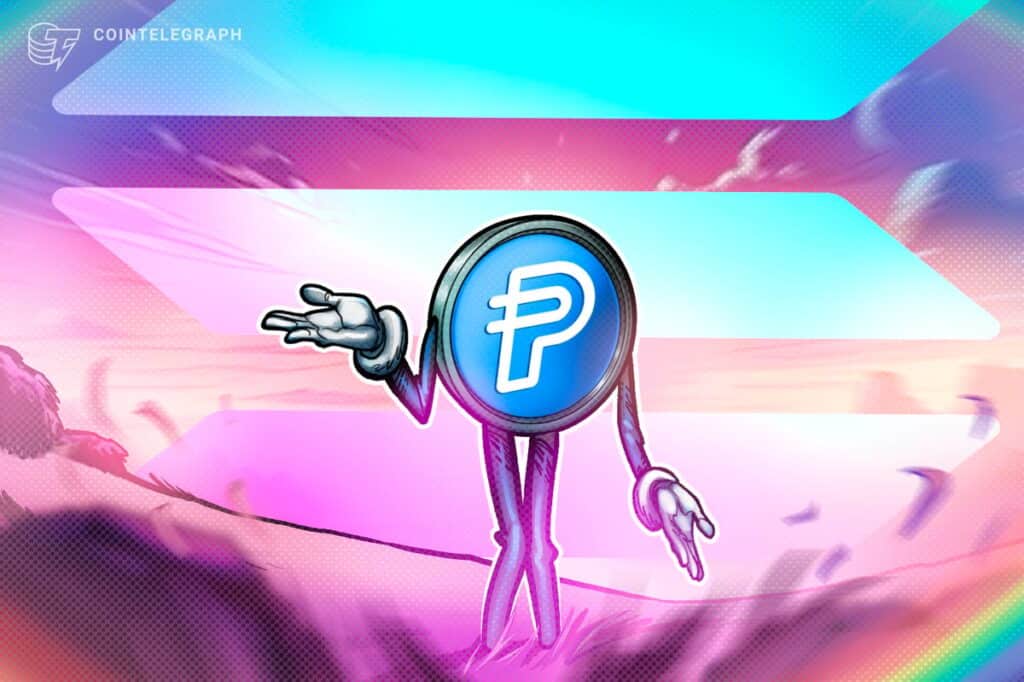How to build PayPal USD (PYUSD) on Solana

PayPal USD (PYUSD) is now available on Solana, giving developers a new stablecoin option for their projects. Easy access to test tokens on the Solana Devnet pipeline, comprehensive developer documentation, and compatibility with the wider Solana ecosystem, building with PUSD has never been more accessible.
This article explains what PYUSD is, where and how to build with PYUSD, and how developers can use this new stable coin for their projects.
What is PYUSD?
The PayPal USD (PYUSD) stablecoin is managed by Paxos Trust Company on behalf of PayPal. The goal is to maintain a stable 1:1 value against the United States dollar, providing the cryptocurrency market with a trusted and secure digital version of the US dollar. By combining PayPal's payment expertise with the technological advantages of blockchains such as Ethereum and Solana, PYUSD seeks to revolutionize digital payments.
Originally launched on the Ethereum blockchain, PYUSD expanded to the Solana blockchain on May 29, 2024, according to PayPal's announcement. Solana, a leading blockchain known for its rapid adoption, has a strong ecosystem with millions of daily transactions and thousands of active developers.
This high-performance network is designed for speed, scalability, and cost-effectiveness, with projected block times of approximately 400 milliseconds and supporting thousands of transactions at an average fee of fractions of a second.
Its global reach ensures that PYUSD transfers are settled instantly at minimal cost regardless of transaction size, making it scalable to a large user base and accessible to anyone with an internet connection. With the flexibility and accessibility offered by this multichain method, users can choose the blockchain that best meets their requirements.
Why build in PYUSD?
PYUSD brings together PayPal's payment expertise and Solana's technical expertise. The stablecoin previously only available on Ethereum is now also available on Solana, providing near-term settlements with high cost-effectiveness, 24/7 availability and global reach. PYUSD use cases include:
Cross-border P2P payments
One can transfer PYUSD to eligible recipients globally using Solana Wallet.
Business to business transfers
Thanks to the programmable features in PYUSD, businesses can develop their own services to facilitate short-distance, cost-effective cross-border transfers with minimal technology requirements.
Micro trading
PYUSD facilitates instant and low-cost microtransactions on Solana. With PYUSD, Web3 traders of nonfungible token (NFT) marketplaces and blockchain-based gaming platforms can integrate with fiat bank accounts using digital native currencies.
International payments
PYUSD eliminates the complex network of multiple banking networks, currencies and digital wallet systems, simplifying international payments.
What are Solana token extensions and their role in PYUSD development?
Token Extensions (TEs) on the Solana blockchain are powerful tools that extend the functionality of the Solana Program Library (SPL) Token Program, a standard for creating tokens. TEs are modules that can be applied to a token to provide specific features or functionality. Adding simple metadata to complex compliance and governance systems are examples of these improvements.
Special TEs PYUSD uses at Solana:
Confidential Transfers: Allow traders the option to keep transaction amounts confidential Maintain visibility of other transaction details for regulatory purposes Transfer Hooks: Enable developers to call custom programs for individuals and traders using PYUSD during token transfers. To include information with payments, creating a more user-friendly experience for everyday payments and transactions.
These token extensions enable the following benefits for PYUSD:
Improved functionality
TEs allow PYUSD transactions to remain confidential to users while remaining transparent to regulators, striking a balance between confidentiality and compliance.
Standard information
The metadata extension allows for standardized storage of important token information such as name, symbol, and logo, making integration with different platforms easier.
Actionable control
The transfer hook extension allows custom logic to be executed with each token transfer, giving more control over how PYUSD interacts with wallets and applications.
Flexible payments
The transfer fee extension allows the implementation of transfer fees, which can be used for various purposes such as network maintenance or revenue generation.
Regulatory compliance
The Permanent Power of Attorney extension allows a designated authority to manage PYUSD tokens for compliance purposes, ensuring compliance with regulatory requirements.
Account management
Mint's near-authority extension ensures efficient management of PUSD tokens to close mint accounts and restore resources.
The benefits for developers of building with PYUSD using token extensions
Developers on the Solana blockchain can realize the full potential of programmable currencies and assets by integrating the SPL Token program with token extensions. This involves the laborious integration of multiple codebases and protocols.
However, developers now have native access to a full suite of programmability features when creating tokens using enabled token extensions. With this simplified method, developers can enable or disable feature-specific capabilities, customizing their tokens to fit the specific requirements of their application.
Additionally, TEs are industry-standard, well-tested and certified extensions that provide PYUSD with enterprise-grade security and reliability. Developers can quickly design and test applications because of reusable requirements.
As plug-and-play modules, TEs provide a fast and proven way to add blockchain and PYUSD to applications. Moreover, since TEs are an open standard, PYUSD can be integrated not only with PayPal, but also with any other compatible wallet, exchange or library. This adaptation encourages innovation in the field of digital payments by allowing developers to freely experiment and expand on PYUSD as needed.
How to build with PYUSD on Solana
The steps below will help interested developers understand how to start building at PYUSD in Solana.
Step 1: Find PYUSD
Finding PYUSD is the first step to working with him. One can buy, sell and use PYUSD on PayPal or Venmo wallets. PayPal's Consumer Protection Policy is available to anyone using the PayPal ecosystem to purchase PYUSD.
Alternatively, one can earn PYUSD using fiat currency from major Solana wallets such as Phantom and crypto exchanges such as Crypto.com. Developers can test PYUSD through the PYUSD pipeline on Solana DevNet.
Step 2: Understand the technical details
PYUSD Mint address
Developers can use the PYUSD Mint URL to integrate PYUSD into an app:
2b1kV6DkPAnxd5ixfnxCpjxmKwqjjaYmCZfHsFu24GXo
On the Solana blockchain, this mint address uniquely identifies the PYUSD token. You can use Solana browser to access mint account details.
token extensions
PYUSD is built on TEs, which represents the next iteration of Solana's program library specification and provides out-of-the-box compliance frameworks, reducing development time. TEs develop new methods to enhance simulation functions.
Essential features like tokenization, transfer, and cooling were part of the original Tokens program, but TEs brought additional features like secret transfers, extended metadata, custom transfer logic, and more (as described in the section above).
Step 3: Merge PYUSD
PYUSD is accessible on major Solana wallets and exchanges, including Phantom and centralized platforms such as Crypto.com. Additionally, eligible users can buy, sell and use PYUSD within the PayPal ecosystem, including PayPal and Venmo.
Developers can easily access and integrate PYUSD with their Solana projects. Experimental PYUSD is available for development and testing in a sandbox through the Solana Devnet pipeline. To understand how to build with PYUSD, they should also learn about token extensions before diving deeper into the development process.
The open source nature of PYUSD and its integration with Solana TEs allows developers to seamlessly integrate it into their applications, enabling easy access, spending and transfer of PYUSD within their applications. For qualified users, PYUSD's compatibility with the Solana ecosystem, including various wallets and platforms, makes digital transactions easily accessible.
Additionally, the Solana and PayPal developer documentation provides detailed information on merging PYUSD and Solana-based tokens. Developers are encouraged to use the icon resources provided when integrating PYUSD with their applications. These resources include PYUSD icons in sizes 128×128 pixels and 220×219 pixels. To download, developers can right-click the image and select “Save Image As…” The PYUSD icon is also available in SVG format via PayPal Objects.
By building with PYUSD, developers can create efficient, inclusive and trusted payment experiences for the digital commerce of the future.
The future of the PYUSD stablecoin
Exciting opportunities lie ahead for PYUSD as new use cases emerge and the coin adapts to changing regulatory environments. Real world assets (RWAs) are a ripe field for PYUSD growth. By enabling smooth, real-time transactions in the RWAs domain, PYUSD will help improve liquidity in the broader illegal real estate market.
The way stablecoin regulations change in the United States may affect PYUSD, which will need to adapt to ensure compliance. Cross-cutting is another critical component to PYUSD's future. Branching with other blockchains will help make stablecoins more adaptable and accessible.
Future developments of PYUSD's security features and smart contracts will play a critical role in its evolution. By improving smart contract capabilities, new features such as automated compliance and more sophisticated financial instruments can emerge.













